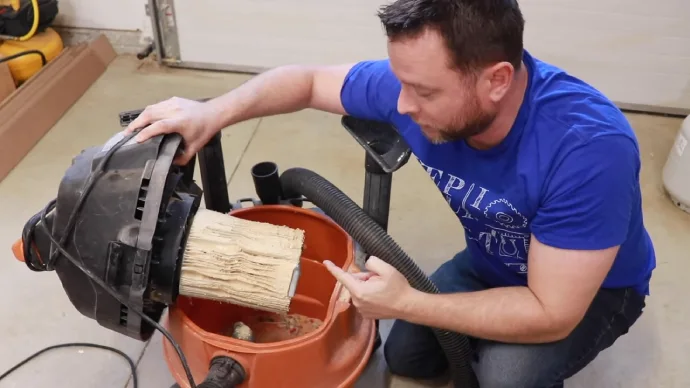Last Updated on March 13, 2023
Living with dust is no fun, and neither is having a shop vac that seems to be blowing out more of the stuff than it should.
Before assuming your vacuum has gone rogue, make sure you understand why this might be happening in the first place. After all, not many people know what causes a clogged-up cleaner to spew dust back into their homes.
The causes of a shop vac blowing dust out are many and varied, but without proper use or maintenance, it could mean more than just an inefficient experience. With lower efficiency comes fewer successful cleaning jobs, the ultimate dirt disaster.
Don’t let shop vac dust leave your home a mess. Read on to discover the surprising causes of shop vac blowing dust, plus helpful tips for giving your home an all-around fresh look.
Why Does Shop Vac Blow Dust: Top 7 Reasons
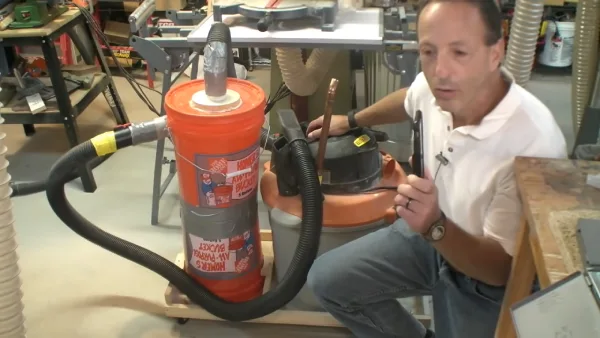
As you know, there are many factors that can contribute to dust blowing out of your vacuum. Here are the top seven most common causes you should be aware of:
Reason #1: You’ve Chosen the Wrong Setting
The first reason a shop vac may blow dust instead of sucking it up could be an incorrect setting selection on the vacuum cleaner itself. Many shop vacs feature multiple suction modes for different types of debris and materials, so it’s crucial to ensure you’re selecting the right one for the job.
For example, if you’re picking up wet debris like mud or liquid spills, you should ensure the vacuum is set to “wet pickup” mode. On the other hand, dry debris, such as dust and dirt, needs to be picked up in “dry pickup” mode.
Reason #2: Poorly Fitting Attachments and Hoses
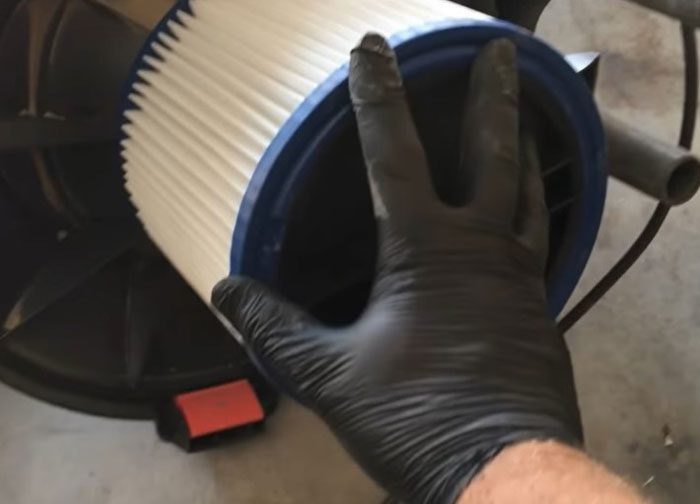
Incorrect size or shape of attachments and hoses can also cause suction loss and subsequent dust blowing as well. Proper fittings between hoses and attachments can significantly reduce suction power even if you select the right vacuum setting.
Always ensure all components are correctly connected before starting any cleaning job with your shop vac. This ensures optimal performance every time, regardless of what materials you’re attempting to clean up.
Reason #3: Clogged Filters and Hoses
Over time, filters and hoses can become clogged with dust particles, reducing their effectiveness at capturing dirt and debris during operation. Depending on how long it has been since your last filter or hose replacement, there might not be enough airflow passing through them at all for them to suck up anything.
Reason #4: The Dust is Too Fine for the Filter
A shop vac may also expel dust if the paper filter isn’t suitable for handling small particles like pollen or lint fibers. Which require a finer level of filtration than most standard filter designs offer.
If this is happening in your case, then make sure you upgrade to a filter explicitly designed to capture these types of fine debris. Otherwise, they will just blow straight out onto whatever surface they previously collected from.
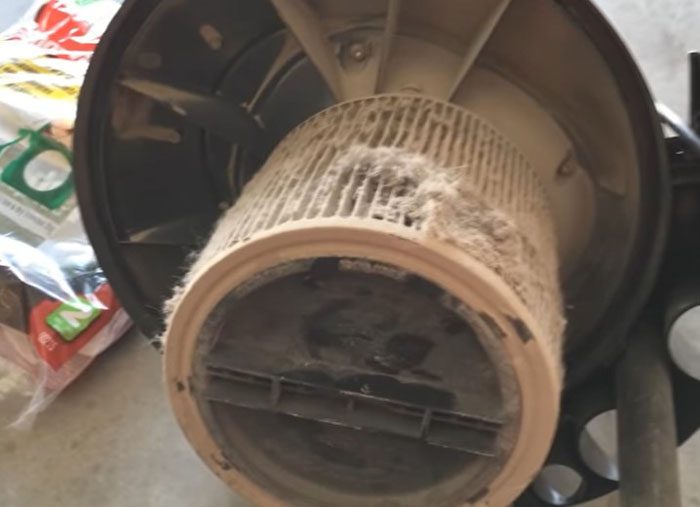
Reason #5: The Drum Is Full
If a shop vacuum has been used extensively without emptying the drum, then there is no space left for additional dirt or dust to be collected. Instead, this excess material will be blown out of the exhaust port along with air and cause more dust in the room.
To avoid this, always empty the drum before use and do not allow it to exceed about two-thirds full capacity for optimal suction power and dust containment.
Reason #6: The Filter Is Leaking or Has Hole In It
Even with proper maintenance, filters accumulate clogs and damage over time, leading to leaks that blow out small particles of dust into the room. Inspect your filter regularly for signs of wear and tear, such as tears, holes, or discoloration from dirt buildup so you can replace it before it affects performance.
Reason #7: Poor Quality Hoses
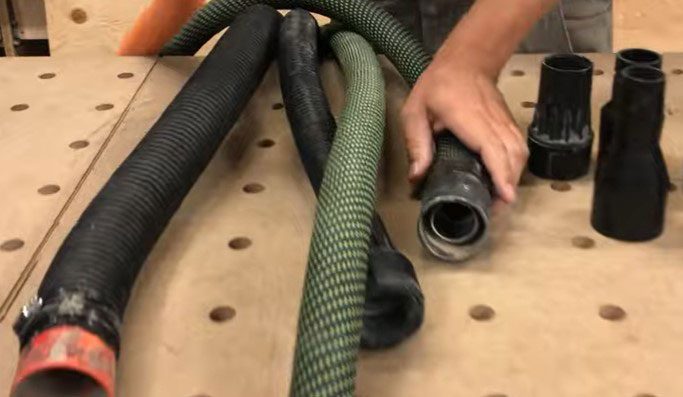
Vacuum hoses play an important role in preventing air leaks while cleaning up large volumes of debris. Investing in quality hoses helps ensure that no matter how much power your shop vacuum has, no extra dust will escape through a faulty hose connection or a small crack in the tubing walls.
Always try to use a good quality hose for your shop vac and replace it as soon as any signs of wear or tear appear.
For example, heavy duty contractor wet dry vac hose, extra long wet/dry vac hose, antistatic shop vac hose, and heavy duty dust collection hose are some of the best options for optimal performance.
Tips to Improve Dust Collection With a Shop Vacuum Unit
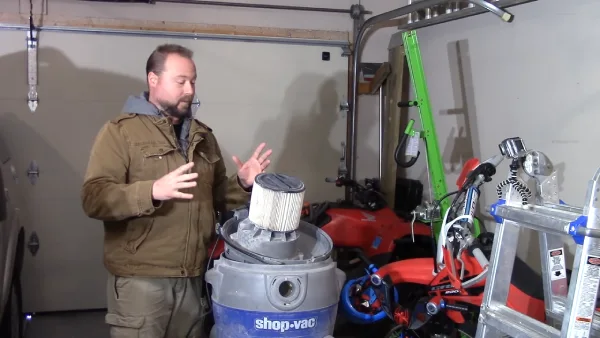
If you’re noticing that your shop vacuum is blowing more heavy dust than usual, then there are several steps you can take to remedy the problem. Here are some tips to keep in mind:
Increase Suction Power: Improve the power of your shop vacuum unit by increasing the horsepower or motor size if possible. This can help to improve suction power and ensure that dirt and debris are drawn in more effectively.
Choose the Appropriate Filter Media: When selecting filter media for your shop vacuum unit, ensure you get a properly sized filter to fit into the housing correctly. This helps avoid clogging, which can reduce suction power, and ensures that fine dust particles don’t escape into the environment.
Upgrade Exhaust Ventilation System: For maximum air volume output, upgrade your shop vacuum unit’s exhaust ventilation system by installing high-flow exhaust fans. This will help to increase airflow and improve the cleaning effectiveness of your unit.
Use Dry Pickup Attachments: To maximize filtration efficiency, use dry pickup attachments for dust collection with your shop vacuum unit instead of wet attachments like brushes or mops. This will keep dust from being blown back out into the atmosphere while you clean up any messes in your workspace or garage.
Regular Maintenance: To keep your shop vacuum unit working well, do some maintenance every once in a while. This includes regularly cleaning filters, checking hoses for leaks, and adjusting nozzles.
Invest In Quality Equipment: When you need to buy a new shop vacuum or upgrade your old one, look for models with high CFM ratings (cubic feet per minute). Look for models with large collection bags/containers with multiple filter material layers.
Add Accessories: Another great way to improve dust collection efficiency with a shop vacuum is by adding various accessories. Such as crevice tools or floor brushes specifically designed for hard floors or carpets to capture larger particles.
Use HEPA-Certified Models When Possible: If you want to enhance dust collection, always look out for HEPA-certified models. This means they meet EPA standards for indoor air quality (IAQ) control.
Can a Shop Vac Without a Filter Produce Dust?
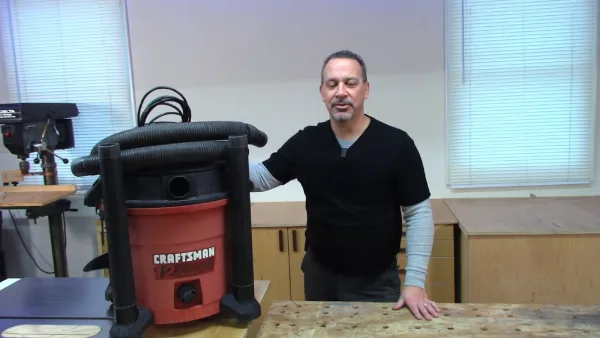
Yes, a shop vacuum without a filter may produce dust. This is because the dust and debris are not being captured by the filter, meaning they have nowhere to go except to be blown back out of the vacuum.
Aside from that, since there is no filter in place, the fan motor that powers the suction may become clogged with debris over time, leading to decreased airflow and an increase in small particles being pushed out of the exhaust.
Does Running a Shop Vac Continuously Cause Dust?
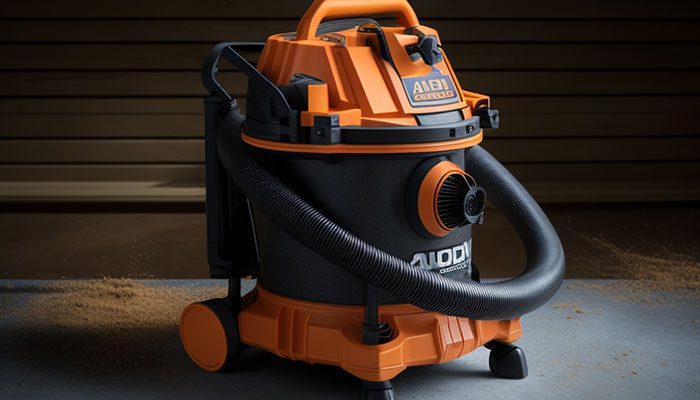
Continuously running a shop vac can increase the dust produced as it draws more dirt from its surroundings with each pass-through. In enclosed spaces where it is used for extended periods, the accumulation of dirt can lead to higher levels of air pollution without regular maintenance.
Since these filters are not rated for long-term use and are improperly maintained, they can become clogged or damaged over time. Continuous operation may lead to malfunctioning or damage to your vacuum’s motor due to inadequate filtering capabilities.
How Often Shop Vacuum Filters Need to Be Changed?
Generally, you should replace your filters every 3-6 months. You may need to change your shop vacuum filter more frequently or less frequently, depending on certain factors. These things include how often you use it, what you use it for (wet or dry), and how sensitive you are to the particles in the air.
Some filters work better than others at catching different-sized particles. It is also advised that if you notice excessive blowing back/a sudden decrease in suction power, you should check your filters. As they may need replacing sooner than recommended timescales suggest.
Can You Clean And Reuse a Shop Vac Filter?
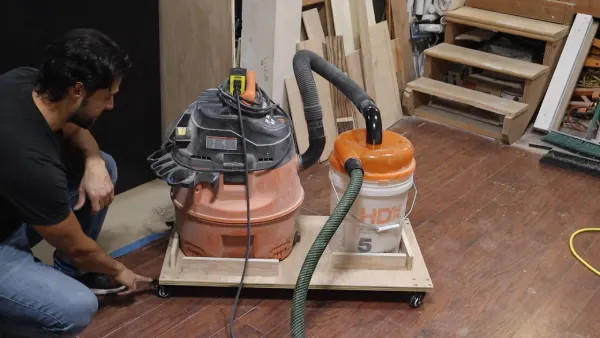
Yes, many types of reusable shop vac filters can be cleaned using water to remove any accumulated dirt/debris from their surface area before reusing them again for further cleaning sessions. Despite this, it is important that after washing your filter with water, it should be allowed ample time so that it can completely dry off.
If there is too much moisture inside the filter, it can cause mold to grow. Mold will damage the filter’s efficiency over time and make it ineffective at capturing particulates. This means that you will need to replace the filter with a new one.
Is It Okay to Use a Shop Vac for Drywall Dust?
Using a shop vac to remove drywall dust is not recommended since the vacuum will not effectively contain all fine dust particles. The suction power of a shop vacuum is often too weak to capture all of the dust from the drywall, meaning that some of it will be left behind.
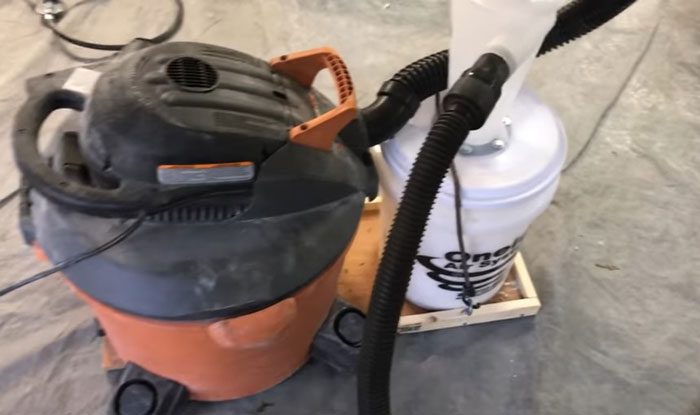
Even if the dust is captured in the vacuum, a shop vacuum’s weaker motor and filtration system may cause some of the dust to be recirculated and redispersed through the air. This could lead to further contamination as well as an unhealthy environment.
For these reasons and more, it is generally advised to invest in a more powerful and better-filtered vacuum specifically designed for cleaning up after drywall dust.
Uncover the Root of Dust Blowing From Shop Vacs
Awareness of the potential causes of shop vac dust blowing is essential to prevent it. In most cases, there are no clear-cut solutions to these problems because they vary from model to model and from situation to situation. No matter what the issue is, understanding the above reasons is key to tackling it.
If you take the time to give your shop vac some care, it’ll keep running strong and tackle all your cleaning projects easily. Now that everything is spick-and-span, get out there, and let’s make that housekeeping dreams a reality.
